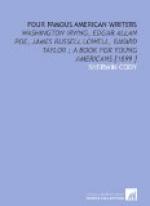Feel a glory in so rolling
On the human heart
a stone.
Now let us see if we can represent by musical notes the meter in which this poem is written. We must remember that a punctuation mark at the end of a line often makes a complete pause, which is represented in music by a rest. In music a rest has the same effect in completing a bar as the corresponding note. Here are the first two lines:
[Illustration: (music) Hear the sledg-es with the bells, Sil-ver bells!]
In the two following lines the commas in the middle of the line stand for rests, like the punctuation at the end of the first line; or if we wish we can make the words “time, time, time,” three longer notes. It all depends on how we pronounce them:
[Illustration: (music) Keep—ing time, time, time, in a sort of Ru-nic rhyme.]
CHAPTER XIII
POE’S LATER YEARS
Poe had the hardest time of his life when he was at New York, living in that little cottage at Fordham, where his poor wife died. He was always borrowing money, from sheer necessity, to keep himself and his wife from starvation. Once while in New York he was so hard pressed that Mrs. Clemm went out to see if she could not get work for him. She went to the office of Nathaniel P. Willis, who was the editor and proprietor of The Mirror. Willis was then starting The Evening Mirror, and said he would give Poe work. So the poet came; he had his little desk in the corner, and did his work meekly and regularly,—poor hack work for which he was paid very little.
Later he had an interest in a paper called The Broadway Journal. When it was about to cease publication Poe bought it himself for fifty dollars, giving a note which Horace Greeley endorsed and finally paid.
Once a young man wrote to Greeley, saying, “Doubtless among your papers you have many autographs of the poet, Edgar Allan Poe,” and intimated that he should like to have one of them. Greeley wrote back that he had just one autograph of Poe among his papers; it was attached to a note for fifty dollars, and Greeley’s own signature was across the back. The young man might have it for just half its face value.
But after Poe bought The Broadway Journal he had no money to carry it on, and its publication was soon suspended.
He earned his livelihood mainly by writing stories or articles for various magazines and papers, which paid him from $5 to $50 each. It was a hand to mouth way of living, for he was often, often disappointed.
In 1845, a volume entitled, “Tales. By Edgar A. Poe,” was published by Wiley and Putnam, and in the same year “The Raven and Other Poems” appeared in book form from the same publishing house. Poe also delivered lectures, and by way of criticism carried on what was called the “Longfellow War.” Though he considered Longfellow the greatest American poet, he accused him of plagiarism, or stealing some of his ideas, which was very unjust on the part of Poe. Hawthorne and Lowell he praised highly.




